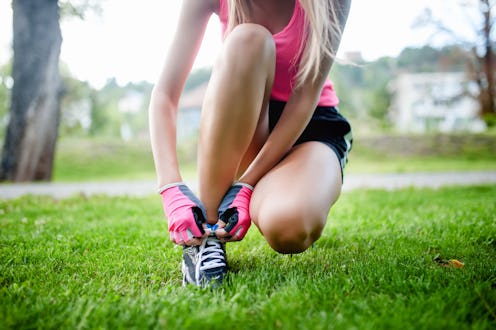Life
Everything You Need to Know About Running

So, you want to be a runner, do you? You're in luck — it's one of the easiest (and cheapest!) workouts to get into. Unfortunately, though, it's not quite as easy as lacing up your sneaks and hitting the road; at least, not if you want to do it right (and, obviously, you want to do it right, otherwise the habit will never stick). Hey, even five minutes of running a day can help you live a longer life. Who doesn't want to reap those health benefits?
But, before you start pounding the pavement (or treadmill), there are a few things you need to know — that's why we tapped Mile High Run Club coach Michael Meliniotis to give us the deets on going the distance. We asked Meliniotis all our running questions so you wouldn't have to.
Below, you'll find all the answers to your running Q's. All you need to do is pick out a new pair of kicks, whip up a playlist, and follow his advice. Now, run like the wind!
1. I'm not a runner. Why should I start?
"Running is more than movement. It's a vehicle for us to overcome — to overcome challenges we set ourselves. We can use running to set and achieve goals, experience vulnerability, stimulate our senses, and take power."
2. People always talk about a runner's high — does that really exist?
"The runner's high is highly individualized. Feeling empowered after a rainy run or feeling the endorphin rush after speed-work training can both provide a runner's high. The high is obvious for some and elusive for others, but it's always a welcome boost."
3. Do I need to wear certain gear while running? What kind?
"Real injuries can result from chafing. It's important to carefully research and select gear that is functional. It should manage sweat, keep you dry, and be friendly to your skin."
4. What kind of designs or technology should I look for in running shoes?
"Running shoes should work with your running form. Running shoes should not be depended on to fix your form. We run with our whole bodies, not with our feet. To expect a running shoe to make major adjustments for us may lead to over-correction and possible injury. Try a few pairs on and run in them. Use common sense and don't overanalyze the fit."
5. What's the most important thing to remember before my first run?
"Warm-up takes 10 to 12 minutes! During a warm-up our heart rates spike up. This can be uncomfortable for a non-runner, and you might want to stop running on the notion that it always feels like that. Keep at it. Run/walk your warm-up and rest assured that your heart rate will settle down and you'll find your groove."
6. What's a realistic goal to keep in mind on my first few runs?
"I like the approach of running for time versus mileage for the first few weeks. Move your body for a half hour at a time every other day. Run, jog, walk, or mix it up — but keep it easy. An easy pace means you can hold a conversation."
7. How long or far should I aim to run on those first few times?
"Getting started means getting past your warm-up. I suggest to runners to start with 15 to 30 minutes with the goal of hitting 30 minutes three to four times per week."
8. Should you start running outside or on the treadmill? What's the difference?
"That's up to your personal preference, although I would suggest a mix of both. Running outside can impact your senses in a positive way. Running on a treadmill can give you instant data that you can use to measure against your goals."
9. What kind of music should you listen to to keep yourself moving?
"I like to map music playlists to a training plan. Keep the warm-up songs light, the middle of the playlist exciting, and the cool-down songs empowering."
10. Is there any particular running technique that will make running feel easier?
"Take shorter strides! This is my number one priority when coaching. When you take shorter strides (or increase your cadence) you are recruiting more energy from your core and taking it easier on your feet and legs. I advise trying for 90 foot strikes, per foot, per minute."
11. What kind of stretches should I do to help avoid sore muscles?
"I only advise stretching when warm. After a run, I pay special attention to calves, hamstrings, and quads. If you can get into your hips and glutes, you'll be in good shape! Like I said earlier, we run with our whole bodies — so stretching across all muscle groups is your goal."
12. Any helpful mind tricks to make running seem easier?
"Embrace it. If you decide to run, look for the empowerment, the fulfillment, the excitement. If you approach it as a box to tick you'll need to play tricks on yourself, which will not be sustainable in all conditions. Get inside the run culture and be a runner."
Written by Ashley Mateo
Images: Hoda Bogdan/Fotolia; Gifbay; Sinfest; Tumblr; Tumblr; Tumblr; Tumblr; Reddit ; Gifbay; Elite Daily; Tumblr; Tumblr; Tumblr.